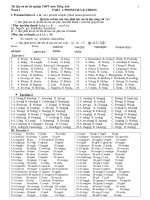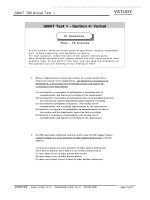Tài liệu ôn thi FCE Intermediate exercises
Bạn đang xem bản rút gọn của tài liệu. Xem và tải ngay bản đầy đủ của tài liệu tại đây (306.79 KB, 49 trang )
“Intermediate Exercises from the Website: www.imparareinglese.com”
Downloaded free of charge from www.imparareinglese.com
Intermediate
Exercises
from the Website: www.imparareinglese.com
Page 1
“Intermediate Exercises from the Website: www.imparareinglese.com”
Downloaded free of charge from www.imparareinglese.com
Index of Exercises
FCE sentence transformation exercises - 1..........................................................................................3
FCE sentence transformation exercises - 2..........................................................................................4
FCE sentence transformation exercises - 3..........................................................................................5
FCE sentence transformation exercises - 4..........................................................................................6
FCE sentence transformation exercises - 5..........................................................................................7
FCE sentence transformation exercises - 6..........................................................................................8
FCE Open Cloze practice - 1................................................................................................................9
FCE Open Cloze practice - 2..............................................................................................................10
FCE Word Formation - 1....................................................................................................................11
FCE Error Correction - 1....................................................................................................................12
Negative prefixes – 1..........................................................................................................................13
Negative prefixes – 2..........................................................................................................................14
Adjective suffixes – 1.........................................................................................................................15
Adjective suffixes – 2.........................................................................................................................16
Adjective suffixes – 3.........................................................................................................................17
Verb suffixes and prefixes..................................................................................................................18
Nouns formed from adjectives - 1......................................................................................................19
Nouns formed from adjectives - 2......................................................................................................20
Nouns formed from adjectives - 3......................................................................................................21
Confusing words - 2...........................................................................................................................22
Make or do?........................................................................................................................................23
Make or do?........................................................................................................................................24
First and second conditionals.............................................................................................................25
First and second conditionals.............................................................................................................26
Present perfect simple or continuous?................................................................................................27
Gerund or infinitive?..........................................................................................................................28
Gerund or infinitive? - 2.....................................................................................................................29
Gerunds and infinitives (with different meanings!)...........................................................................30
Active and passive adjectives.............................................................................................................31
Dependent prepositions......................................................................................................................32
Prepositions of movement..................................................................................................................33
Extreme adjectives..............................................................................................................................34
Wish....................................................................................................................................................35
Wish - 2...............................................................................................................................................36
Order of adjectives.............................................................................................................................37
Used to or Would?..............................................................................................................................38
Basic future forms..............................................................................................................................39
Basic Future Forms - 2.......................................................................................................................40
Future time clauses.............................................................................................................................41
Test your verb forms...........................................................................................................................42
Test your verb forms - 2.....................................................................................................................43
Test your verb forms - 3.....................................................................................................................44
ANSWERS TO EXERCISES............................................................................................................45
Page 2
“Intermediate Exercises from the Website: www.imparareinglese.com”
Downloaded free of charge from www.imparareinglese.com
-FCE sentence transformation exercises - 1
Complete the second sentence so that it has a similar meaning to the first sentence using the
word given (in brackets). Use between two and five words. Do not change the word given.
1 I moved here 10 years ago.
I____________________ for 10 years. (lived)
2 I'm not as old as my brother.
My brother ____________________ me. (than)
3 'Why don't we go to the cinema?'
____________________ to the cinema? (going)
4 I regret not studying harder when I was at school.
I wish ____________________ when I was at school.(studied)
5 Someone has killed the party leader in a car bomb attack.
The party leader ____________________ in a car bomb attack .(has)
6 It's too cold to go to the beach today.
It's ____________________ to the beach today.(warm)
7 You won't pass the exam unless you study harder.
If ____________________ you won't pass the exam.(don't)
8 It took me two weeks to recover from the flu.
I needed ____________________ the flu.(over)
9 He crashed his car because he wasn't paying attention.
If he ____________________ he wouldn't have crashed his car.(been)
10 The doctor suggested that I starting playing golf.
The doctor suggested I ____________________ golf.(up)
Page 3
“Intermediate Exercises from the Website: www.imparareinglese.com”
Downloaded free of charge from www.imparareinglese.com
-FCE sentence transformation exercises - 2
Complete the second sentence so that it has a similar meaning to the first sentence using the
word given (in brackets). Use between two and five words. Do not change the word given.
1 What are your plans for the weekend?
What ____________________ at the weekend? (do)
2 I haven't visited my family since 2005.
The ____________________ my family was in 2005. (time)
3 'If I were you, I would study law at university.'
He ____________________ at university.(advised)
4 She complains all the time about the teacher.
She ____________________ about the teacher.(keeps)
5 What was your favourite subject at school?
What ____________________ at school? (enjoy)
6 She won't be allowed to come to the party.
Her parents ____________________ the party.(let)
7 Speaking English is still strange for me.
I'm ____________________ English.(used)
8 I wasn't able to understand much until I had studied for several years.
It was ____________________ understand much.(before)
9 When the test had finished I remembered the correct answers!
I didn't ____________________ the test had finished.(remember)
10 She can't have passed the exam - she's useless at maths!
She ____________________ the exam - she's useless at maths!(failed)
Page 4
“Intermediate Exercises from the Website: www.imparareinglese.com”
Downloaded free of charge from www.imparareinglese.com
-FCE sentence transformation exercises - 3
Complete the second sentence so that it has a similar meaning to the first sentence using the
word given (in brackets). Use between two and five words. Do not change the word given.
1 The car had almost stopped when it hit the wall.
The car ____________________ when it hit the wall. (hardly)
2 Despite having several broken bones, John was able to compete in the race.
John was able to compete in the race ____________________ several broken bones.
(though)
3 My grandfather is one of the last people alive who fought in the war.
Other than my grandfather there ____________________ who fought in the war.
(very)
4 That car was too expensive for us to buy.
We would have bought that car ____________________ so expensive. (not)
5 'Don't do that again, or you'll be in trouble!' said the teacher.
The students ____________________ do that again. (warned)
6 I can't believe this is the best hotel in the city!
There must be ____________________ one in the city.(hotels)
7 Course fees must be paid in full before the course begins.
Students ____________________ before the course begins.(all)
8 I haven't been to Oxford for at least ten years.
The last time ____________________ at least ten years ago.(went)
9 My parents are both the same age.
My mother ____________________ my father.(as)
10 Learning French is a waste of time because the language is not widely spoken.
There's ____________________ because the language is not widely spoken.(point)
Page 5
“Intermediate Exercises from the Website: www.imparareinglese.com”
Downloaded free of charge from www.imparareinglese.com
-FCE sentence transformation exercises - 4
Complete the second sentence so that it has a similar meaning to the first sentence using the
word given (in brackets). Use between two and five words. Do not change the word given.
1 It was difficult for Sarah to learn to read in Japanese.
Sarah ____________________ to read in Japanese. (difficulty)
2 The police had to find out whose fingerprints they were.
The police had to find out ____________________ to. (belonged)
3 Many people say that there is a ghost in that house.
There ____________________ a ghost in that house. (supposed)
4 It might rain this afternoon so take an umbrella.
Take an umbrella ____________________ this afternoon. (rains)
5 You look the same as you did when we last met ten years ago.
You have ____________________ our last meeting ten years ago. (changed)
6 You didn't need to rewrite the composition.
It ____________________ to rewrite the composition. (was)
7 Toby said that I had taken his girlfriend.
Toby ____________________ his girlfriend. (accused)
8 'Does English bore you?' the teacher asked Fredrick.
The teacher asked Fredrick ____________________ him. (if)
9 It was the child's grandfather who taught him to read music.
The child ____________________ by his grandfather. (was)
10 I regret not being able to speak French fluently.
I ____________________ fluently. (could)
Page 6
“Intermediate Exercises from the Website: www.imparareinglese.com”
Downloaded free of charge from www.imparareinglese.com
FCE sentence transformation exercises - 5
Complete the second sentence so that it has a similar meaning to the first sentence using the
word given (in brackets). Use between two and five words. Do not change the word given.
1 'Would you like to come for dinner at our house?' asked Ruth.
Ruth ____________________ come for dinner at their house. (invited)
2 Ivan didn't find it difficult to give up smoking.
Ivan ____________________ smoking. (difficulty)
3 Stefania's suggestions are always useful.
Stefania ____________________ are always useful. (someone)
4 The witness described the assassin in detail.
The witness ____________________ of the assassin. (description)
5 It's a pity we didn't see Athens when we visited Greece.
If only ____________________ when we visited Greece. (could)
6 A very interesting guide told us about the exhibits.
We ____________________ by a very interesting guide. (were)
7 The test was too difficult for the students to pass.
The test ____________________ that the students couldn't pass it. (so)
8 The mechanic in the town centre repaired my father's car.
My father ____________________ the mechanic in the town centre. (had)
9 I only passed the exam because the teacher helped me.
If the teacher had not ____________________ have passed the exam. (not)
10 People say that cats have nine lives.
Cats ____________________ nine lives. (said)
Page 7
“Intermediate Exercises from the Website: www.imparareinglese.com”
Downloaded free of charge from www.imparareinglese.com
FCE sentence transformation exercises - 6
Complete the second sentence so that it has a similar meaning to the first sentence using the
word given (in brackets). Use between two and five words. Do not change the word given.
1 The school has postponed the trip to London until next week.
The school trip to London ____________________ until next week. (off)
2 Meri accidentally crashed her father's car.
Meri did ____________________ her father's car. (mean)
3 It was wrong of you to copy the homework from your friend.
You should ____________________ the homework from your friend. (copied)
4 You may not find it easy to understand phrasal verbs.
It ____________________ for you to understand phrasal verbs. (might)
5 The best surgeon in town did Paolo's operation.
Paolo ____________________ the best surgeon in town. (had)
6 In my opinion you'll be a fantastic teacher!
I ____________________ you'll be a fantastic teacher! (no)
7 I last visited London 7 years ago.
I have ____________________ seven years. (not)
8 'I'll be home by midnight,' said Isadora.
Isadora promised she ____________________ midnight. (get)
9 Teachers from the British Council started this school.
This school ____________________ teachers from the British Council. (set)
10 Chiara spent years trying to pass the First Certificate exam.
It ____________________ the First Certificate exam. (took)
Page 8
“Intermediate Exercises from the Website: www.imparareinglese.com”
Downloaded free of charge from www.imparareinglese.com
FCE Open Cloze practice - 1
Complete the text using one word in each space.
British and American English
Students of English all over the world are aware that (0) there are differences
(1)_____ British and American English. But how great are the differences really?
The varieties (2)_____ English have historical roots. (3) _____ pilgrims left
England in the seventeenth century, (4) _____ language has evolved, giving rise to
changes (5) _____ vocabulary, grammar and spelling. Many of the (6) _____
obvious differences are in the vocabulary used in the two countries (7) _____ many
of the words in common use in the twentieth century (8) _____ not exist in the
seventeenth (9) _____ . "Pavements" in Britain, and "sidewalks" in the USA, only
became common later, (10) _____ example.
The two countries (11) _____ also borrowed words from different sources:
courgettes (12) _____ imported to Britain from France (13) _____ zucchini were
brought to America (14) _____ Italian immigrants.
Printing was a relatively new invention in the seventeenth century and the spelling
of (15) _____ words had not yet been formalised, which accounts for many of the
differences in spelling.
Page 9
“Intermediate Exercises from the Website: www.imparareinglese.com”
Downloaded free of charge from www.imparareinglese.com
FCE Open Cloze practice - 2
Complete the text using one word in each space.
Fast food
The concept of “fast food” is very important in English-speaking countries (0) for
one major reason: the working day starts at around the same time (1) _____ in
European countries, but finishes (2) _____ earlier, typically at about five o'clock in
(3) _____ evening when the offices, banks and many of the shops begin to close. As
a result, there's not much time for lunch, (4) _____ many people bring something
from home to eat at their desks, (5) _____ with a cup of tea or instant coffee made
with the office kettle, (6) _____ than going out to a restaurant for a “proper” lunch
as do many European office workers, (7) _____ usually finish work much later in
the evening.
For (8) _____ who prefer to get out of the office to have a break or (9) _____ fresh
air, there are the various fast food options (10) _____ as sandwiches, Cornish
pasties, burgers, kebabs, or fish and chips, many of (11) _____ can be eaten “on the
move”, (12) _____ even the need to sit down!
Only on special occasions is a British office worker likely to eat lunch in a
restaurant. (13) _____ someone's birthday, promotion, engagement or retirement,
for example, a group of colleagues will eat together in a pub or restaurant. It is for
this reason (14) _____ foreign visitors are often surprised (15) _____ the lack of
affordable, good quality, places to have lunch in the major British cities.
Page 10
“Intermediate Exercises from the Website: www.imparareinglese.com”
Downloaded free of charge from www.imparareinglese.com
FCE Word Formation - 1
Use the word given in capitals at the end of each line to form a word that fits in the space in
the same line. There is an example at the beginning (0).
Take-away food in Britain
The fish and chip shop is the most (0) traditional form of British TRADITION
take-away, a place which sells (1) __________ hot meals at lunch time AFFORD
and in the evening. However, the last thirty or forty years have seen the rapid
spread of foreign fast food restaurants, and there are now few towns without
Chinese, Indian and Italian restaurants, as well as many other
(2) __________ of food. VARY
Despite the constant (3) __________ , the concept is always the same: INNOVATE
(4) __________ meals to eat in or take away for clients who don't have ECONOMY
the time or energy to cook for themselves. Restaurants such as MacDonalds
pioneered the idea of fast food to be eaten whilst sitting down in the restaurant
itself, and also developed ways of (5) __________ their customers ate SURE
(6) __________ and left. QUICK
Visitors to Britain are advised to try everything at least once, (7) ________ SPECIAL
the foods which are not common in their own countries. They are also warned not
to make (8) _________ with the food they eat at home; the pizza and COMPARE
pasta which is served in London, is very (9) ___________ to be LIKE
as (10) __________ as the dishes available in Naples or Rome. TASTE
Page 11
“Intermediate Exercises from the Website: www.imparareinglese.com”
Downloaded free of charge from www.imparareinglese.com
FCE Error Correction - 1
For questions 1-15, read the text below and look carefully at each line. Some of the lines are
correct, and some have a word which should not be there.
If a line is correct, write OK (in CAPITAL LETTERS) in the box at the end of the line. If a
line has a word which should NOT be there, write the word in the box at the end of the line.
There are two examples at the beginning (0 and 00).
The Economic Outlook
The last few decades have been difficult ones for the our country, but after several years (0) the
of positive global economic conditions, things are now looking good for the economy. (00) OK
There is a high growth and low unemployment so we are getting richer all the time and (1)
most people have jobs. The economy is stable with price and wage inflation are at only 2% and (2)
interest rates which are low, so allowing people to buy their own homes and businesses to (3)
invest cheaply in capital projects. Demand for consumer goods is high, creating good market (4)
conditions for the retail and service sectors. (5)
Many people can believe that the present situation is due to the government’s strict monetary (6)
policy, and the Central Bank‘s role in controlling inflation. Moreover, taxes have been kept low in (7)
order to stimulate demand, and there is been an extensive policy of privatisation. (8)
Not everything is looking so positive though - our manufacturing and agricultural sectors have (9)
experienced declines last year and are now in recession. There is also a the growing balance of (10)
payments deficit. One of the reasons for this is the exchange rate, our currency is being (11)
particularly strong against those of our competitors – this makes exports uncompetitive in terms (12)
of price. In addition to this, prices on the stock exchange have been falling down recently, (13)
creating difficulties for investors, and there is a general shortage of the skilled workers – partly (14)
caused by a brain-drain as many of key staff are lured abroad by higher salaries. (15)
Page 12
“Intermediate Exercises from the Website: www.imparareinglese.com”
Downloaded free of charge from www.imparareinglese.com
Negative prefixes – 1
Write the negative form of these words by adding a negative prefix: "un-", "dis-", "ir-",
"il-", "in-", or "im-".
1 comfortable
2 patient
3 honest
4 lucky
5 formal
6 possible
7 popular
8 lock
9 appear
10 agree
11 legal
12 polite
13 like
14 logical
15 convenient
Page 13
“Intermediate Exercises from the Website: www.imparareinglese.com”
Downloaded free of charge from www.imparareinglese.com
Negative prefixes – 2
Write the negative form of these words by adding a negative prefix: "un-", "dis-", "ir-",
"il-", "in-", or "im-".
1 frequent
2 mature
3 legible
4 moral
5 regular
6 believable
7 approve
8 curable
9 familiar
10 grateful
11 relevant
12 dependent
13 responsible
14 accurate
15 resistible
Page 14
“Intermediate Exercises from the Website: www.imparareinglese.com”
Downloaded free of charge from www.imparareinglese.com
Adjective suffixes – 1
Form adjectives from these verbs using one (or more) of the following suffixes: "-able", "ive", "-ing", "-ion", "-al", or "-ory".
1 bore
2 depend
3 attract
4 decide
5 explain
6 entertain
7 destroy
8 read
9 agree
10 enjoy
11 educate
12 create
13 protect
14 suit
15 criticise
Page 15
“Intermediate Exercises from the Website: www.imparareinglese.com”
Downloaded free of charge from www.imparareinglese.com
Adjective suffixes – 2
Form adjectives from these nouns using one (or more) of the following suffixes: "-y", "-ly",
"-ous", "-able", "-ful", "-al", or "-ic".
1 rain
2 mountain
3 art
4 science
5 practice
6 energy
7 comfort
8 infection
9 value
10 success
11 week
12 danger
13 democracy
14 music
15 peace
Page 16
“Intermediate Exercises from the Website: www.imparareinglese.com”
Downloaded free of charge from www.imparareinglese.com
Adjective suffixes – 3
Form adjectives from these nouns using one (or more) of the following suffixes: "-y", "-ly",
"-ous", "-able", "-ful", "-al", or "-ic".
1 friend
2 grass
3 religion
4 courage
5 fame
6 sympathy
7 alcohol
8 distance
9 literature
10 politics
11 peace
12 fashion
13 profit
14 medicine
15 drama
Page 17
“Intermediate Exercises from the Website: www.imparareinglese.com”
Downloaded free of charge from www.imparareinglese.com
Verb suffixes and prefixes
Form verbs from these nouns and adjectives by changing the spelling or by using one (or
more) of the following suffixes or prefixes: "-ous", "-en", or "en-".
1 blood
2 proof
3 fright
4 courage
5 danger
6 strength
7 width
8 length
9 sweet
10 deep
11 weak
12 worse
13 bright
14 wide
15 deaf
Page 18
“Intermediate Exercises from the Website: www.imparareinglese.com”
Downloaded free of charge from www.imparareinglese.com
Nouns formed from adjectives - 1
Form nouns from these adjectives!
1 important
2 famous
3 hot
4 true
5 poor
6 sad
7 safe
8 free
9 angry
10 efficient
11 curious
12 stupid
13 perfect
14 excited
15 happy
Page 19
“Intermediate Exercises from the Website: www.imparareinglese.com”
Downloaded free of charge from www.imparareinglese.com
Nouns formed from adjectives - 2
Form nouns from these adjectives!
1 wealthy
2 hungry
3 young
4 high
5 warm
6 silent
7 patient
8 popular
9 kind
10 generous
11 difficult
12 lazy
13 long
14 intelligent
15 terrible
Page 20
“Intermediate Exercises from the Website: www.imparareinglese.com”
Downloaded free of charge from www.imparareinglese.com
Nouns formed from adjectives - 3
Form nouns from these adjectives!
1 cruel
2 necessary
3 arrogant
4 ill
5 weak
6 frequent
7 private
8 deep
9 wide
10 strong
11 boring
12 healthy
13 confident
14 innocent
15 violent
Page 21
“Intermediate Exercises from the Website: www.imparareinglese.com”
Downloaded free of charge from www.imparareinglese.com
Confusing words - 2
Select the correct answer from the menu
1 John has so many dresses/clothes he needs a new wardrobe to put them all in!
2 What I like about my job is that I can know/meet lots of new people.
3 The children are only behaving badly because they are annoyed/bored . Find
them something to do!
4 My grandmother has to go into hospital for some tests/exams .
5 I used to have a very boring job working in a fabric/factory .
6 The doctor said I had to make an appointment with a specialist so that she could
examine/visit me.
7 That was such a terrible/terrific film that I'm going to buy the DVD when it comes
out.
8 Don't forget to close/switch off the TV before you go to bed.
9 I had a terrible discussion/argument with my boss, and now I'm worried I'll lose
my job.
10 The nice thing about a family funeral is the chance to see all your relatives/
parents again.
11 I live in the city, but my family still lives in a small village/country in the
mountains.
12 At school my favourite subject/argument was maths.
Page 22
“Intermediate Exercises from the Website: www.imparareinglese.com”
Downloaded free of charge from www.imparareinglese.com
Make or do?
Write “make” or “do” in each space:
1 _____ homework.
2 _____ an exam.
3 _____ a mistake.
4 _____ a decision.
5 _____ money.
6 _____ the shopping.
7 _____ a film.
8 _____ progress.
9 _____ your best.
10 _____ housework.
11 _____ a suggestion.
12 _____ a profit or a loss.
Page 23
“Intermediate Exercises from the Website: www.imparareinglese.com”
Downloaded free of charge from www.imparareinglese.com
Make or do?
Write “make” or “do” in each space:
1 _____ the ironing.
2 _____ the washing.
3 _____ an effort.
4 _____ a decision.
5 _____ something stupid.
6 _____ an exercise.
7 _____ a film.
8 _____ a noise.
9 _____ dinner.
10 _____ your duty.
11 _____ the dishes.
12 _____ a point.
Page 24
“Intermediate Exercises from the Website: www.imparareinglese.com”
Downloaded free of charge from www.imparareinglese.com
First and second conditionals
Construct first or second conditional sentences by re-writing the words in order
1 I'd house. was I buy If a rich
2 time I'd more I If conditionals. study had
3 you I I'll, help homework. have If your with time
4 country you would choose? which you anywhere could live If
5 won't He much studies pass he exam unless, harder. his
6 her she would but marry won't I agree.
7 be I change I'd career If cook. a could my
8 in my English is better. when work London I'm to going
Page 25









